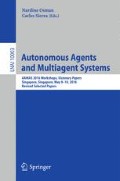Abstract
As increasingly large-scale multiagent simulations are being implemented, new methods are becoming necessary to make sense of the results of these simulations. Even concisely summarizing the results of a given simulation run is a challenge. Here we pose this as the problem of simulation summarization: how to extract the causally-relevant descriptions of the trajectories of the agents in the simulation. We present a simple algorithm to compress agent trajectories through state space by identifying the state transitions which are relevant to determining the distribution of outcomes at the end of the simulation. We present a toy-example to illustrate the working of the algorithm, and then apply it to a complex simulation of a major disaster in an urban area.
Access this chapter
Tax calculation will be finalised at checkout
Purchases are for personal use only
References
Adiga, A., Mortveit, H.S., Wu, S.: Route stability in large-scale transportation models. In: Main 2013: The Workshop on Multiagent Interaction Networks at AAMAS 2013, Saint Paul, Minnesota, USA (2013)
Barrett, C., Beckman, R., Berkbigler, K., Bisset, K., Bush, B., Campbell, K., Eubank, S., Henson, K., Hurford, J., Kubicek, D., Marathe, M., Romero, P., Smith, J., Smith, L., Speckman, P., Stretz, P., Thayer, G., Eeckhout, E., Williams, M.D.: TRANSIMS: transportation analysis simulation system. Technical report LA-UR-00-1725. An earlier version appears as a 7 part technical report series LA-UR-99-1658 and LA-UR-99-2574 to LA-UR-99-2580, Los Alamos National Laboratory Unclassified Report (2001)
Barrett, C., Eubank, S., Marathe, A., Marathe, M., Swarup, S.: Synthetic information environments for policy informatics: a distributed cognition perspective. In: Johnston, E. (ed.) Governance in the Information Era: Theory and Practice of Policy Informatics, pp. 267–284. Routledge, New York (2015)
Buddemeier, B.R., Valentine, J.E., Millage, K.K., Brandt, L.D., Region, N.C.: Key response planning factors for the aftermath of nuclear terrorism. Technical report LLNL-TR-512111, Lawrence Livermore National Lab, November 2011
Chandan, S., Saha, S., Barrett, C., Eubank, S., Marathe, A., Marathe, M., Swarup, S., Vullikanti, A.K.: Modeling the interactions between emergency communications and behavior in the aftermath of a disaster. In: The International Conference on Social Computing, Behavioral-Cultural Modeling, and Prediction (SBP), 2–5 April 2013, Washington DC, USA (2013)
Crutchfield, J.P., Ellison, C.J., Mahoney, J.R.: Time’s barbed arrow: irreversibility, crypticity, and stored information. Phys. Rev. Lett. 103(9), 094101 (2009)
Crutchfield, J.P., Young, K.: Inferring statistical complexity. Phys. Rev. Lett. 63(2), 105–108 (1989)
Ellison, C.J., Mahoney, J.R., Crutchfield, J.P.: Prediction, retrodiction, and the amount of information stored in the present. J. Stat. Phys. 136(6), 1005–1034 (2009)
Ferguson, N.M., Cummings, D.A.T., Cauchemez, S., Fraser, C., Riley, S., Meeyai, A., Iamsirithaworn, S., Burke, D.S.: Strategies for containing an emerging influenza pandemic in Southeast Asia. Nature 437, 209–214 (2005)
Goldman, C.V., Zilberstein, S.: Communication-based decomposition mechanisms for decentralized MDPs. J. Artif. Int. Res. 32(1), 169–202 (2008)
Marshall, B.D.L., Galea, S.: Formalizing the role of agent-based modeling in causal inference and epidemiology. Am. J. Epidemiol. 181(2), 92–99 (2015)
Meliou, A., Gatterbauer, W., Halpern, J.Y., Koch, C., Moore, K.F., Suciu, D.: Causality in databases. IEEE Data Eng. Bull. 33(3), 59–67 (2010)
Meliou, A., Gatterbauer, W., Moore, K.F., Suciu, D.: Why so? or why no? Functional causality for explaining query answers. In: Proceedings of the 4th International Workshop on Management of Uncertain Data (MUD), pp. 3–17 (2010)
Parikh, N., Swarup, S., Stretz, P.E., Rivers,C.M., Lewis, B.L., Marathe, M.V., Eubank, S.G., Barrett, C.L., Lum, K., Chungbaek, Y.: Modeling human behavior in the aftermath of a hypothetical improvised nuclear detonation. In: Proceedings of the International Conference on Autonomous Agents and Multiagent Systems (AAMAS), Saint Paul, MN, USA, May 2013
Parikh, N., Youssef, M., Swarup, S., Eubank, S.: Modeling the effect of transient populations on epidemics in Washington DC. Sci. Rep. 3, Article no. 3152 (2013)
Shahaf, D., Guestrin, C., Horvitz, E.: Metro maps of science. In: Proceedings of the KDD (2012)
Shahaf, D., Guestrin, C., Horvitz, E.: Trains of thought: generating information maps. In: Proceedings of the WWW, Lyon, France (2012)
Shalizi, C.R., Crutchfield, J.P.: Computational mechanics: pattern and prediction, structure and simplicity. J. Stat. Phys. 104(3/4), 817–879 (2001)
Shalizi, C.R., Shalizi, K.L.: Blind construction of optimal nonlinear recursive predictors for discrete sequences. In: Chickering, M., Halpern, J. (eds.) Proceedings of the Twentieth Conference on Uncertainty in Artificial Intelligence, Banff, Canada, pp. 504–511 (2004)
Sutton, R., Precup, D., Singh, S.: Between MDPs and semi-MDPs: a framework for temporal abstraction in reinforcement learning. Artif. Intell. 112(1–2), 181–211 (1999)
Ver Steeg, G., Galstyan, A.: Information transfer in social media. In: Proceedings of WWW (2012)
Walloth, C., Gurr, J.M., Schmidt, J.A. (eds.): Understanding Complex Urban Systems: Multidisciplinary Approaches to Modeling. Springer, New York (2014)
Wein, L.M., Choi, Y., Denuit, S.: Analyzing evacuation versus shelter-in-place strategies after a terrorist nuclear detonation. Risk Anal. 30(6), 1315–1327 (2010)
Acknowledgments
We thank our external collaborators and members of the Network Dynamics and Simulation Science Lab (NDSSL) for their suggestions and comments. This work has been supported in part by DTRA CNIMS Contract HDTRA1-11-D-0016-0001, DTRA Grant HDTRA1-11-1-0016, NIH MIDAS Grant 5U01GM070694-11, NIH Grant 1R01GM109718, NSF NetSE Grant CNS-1011769, and NSF SDCI Grant OCI-1032677.
Author information
Authors and Affiliations
Corresponding author
Editor information
Editors and Affiliations
Rights and permissions
Copyright information
© 2016 Springer International Publishing AG
About this paper
Cite this paper
Parikh, N., Marathe, M., Swarup, S. (2016). Summarizing Simulation Results Using Causally-Relevant States. In: Osman, N., Sierra, C. (eds) Autonomous Agents and Multiagent Systems. AAMAS 2016. Lecture Notes in Computer Science(), vol 10003. Springer, Cham. https://doi.org/10.1007/978-3-319-46840-2_6
Download citation
DOI: https://doi.org/10.1007/978-3-319-46840-2_6
Published:
Publisher Name: Springer, Cham
Print ISBN: 978-3-319-46839-6
Online ISBN: 978-3-319-46840-2
eBook Packages: Computer ScienceComputer Science (R0)

